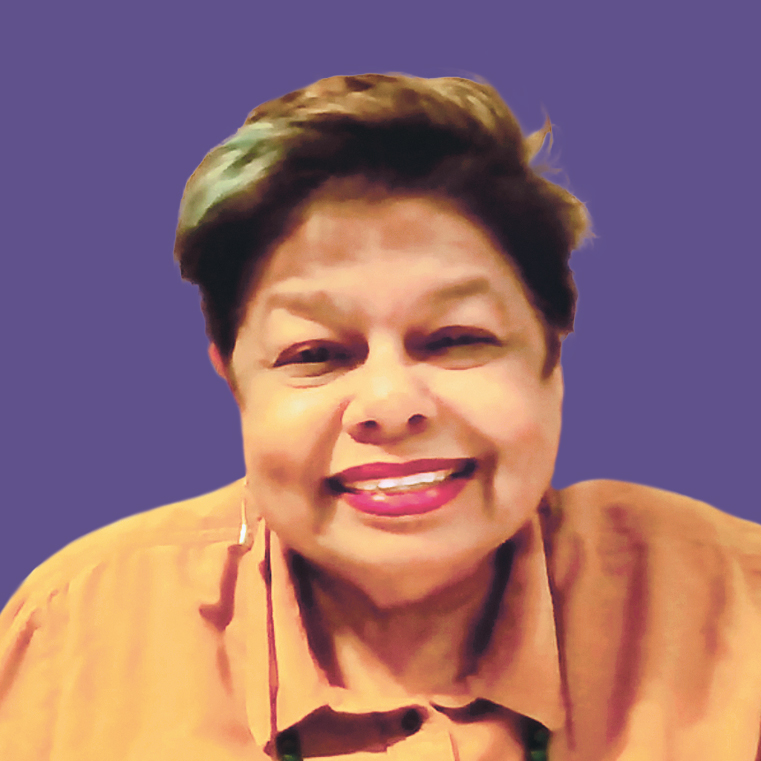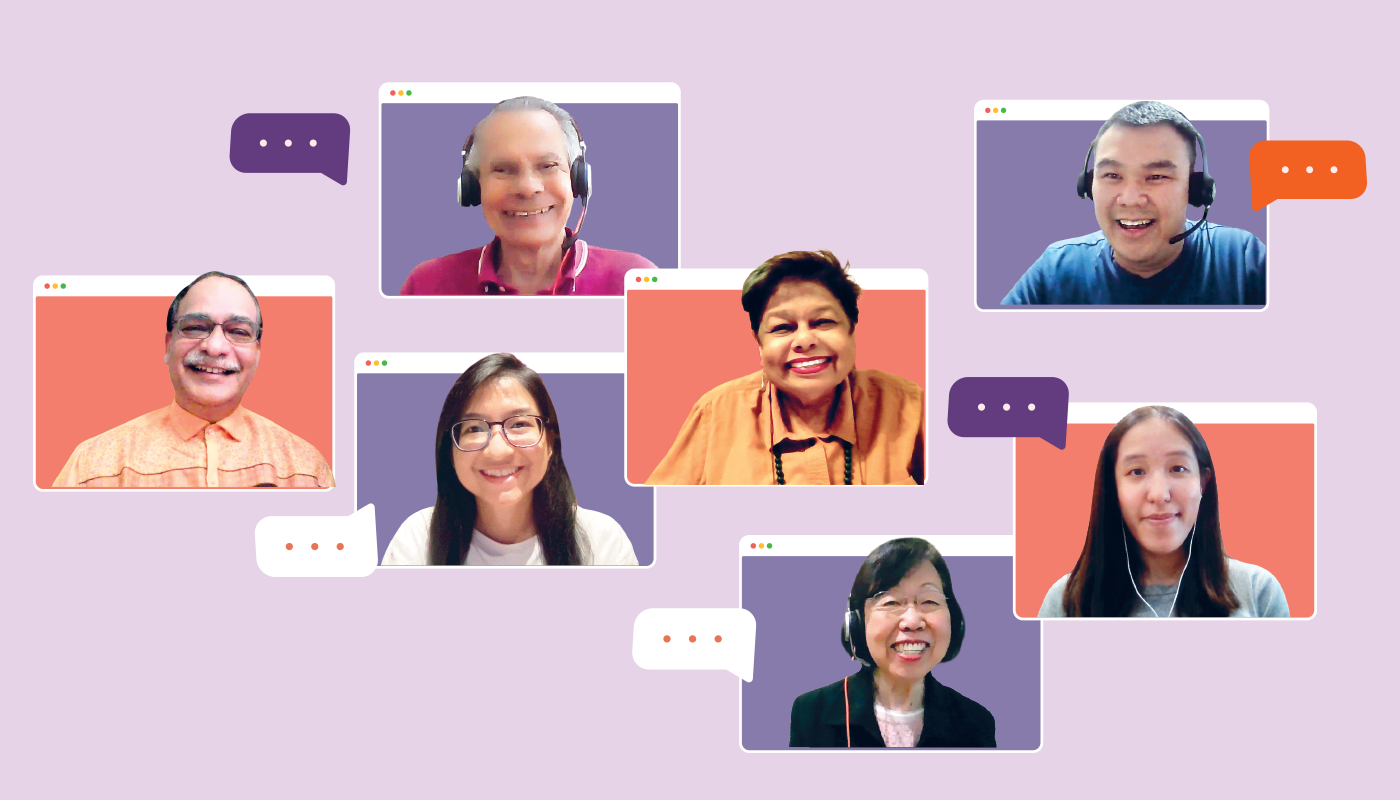Riding The Silver Wave
NUS alumni discuss the current state of eldercare in Singapore, and what it will take to move towards inclusive solutions.
An Age-old Issue
It is projected that, by 2030, 23.8 per cent of Singapore’s resident population will be aged 65 years and over. Singapore has been preparing for this since the 1980s, when a Committee on the Problems of the Aged was formed to study the implications of, and recommend responses to, an ageing population. As each cohort of seniors enjoys progressively better education, income and health, their needs and aspirations become more varied. Our alumni discuss the blind spots and challenges going forward.
OUR PANEL

Mr Donald Wyatt
(Arts ’60)
Retired; founding committee member of charity fundraiser NUS Rag & Flag

Ms Chan Mee Leen
(Science ’70)
Retired principal

Ms Zaibun Nissa Siraj
(Arts ’68)
Trainer, motivational speaker and author

Mr Sharma Sundareswara
(Law ’85)
Adjunct Senior Lecturer

Mr Alvin Chua
(Arts and Social Sciences ’03)
Social Work Instructor

Ms Lee Zheng Fen
(Science ’18)
Works in healthcare outreach

Ms Goh Shi Chun
(Arts and Social Sciences ’18)
Medical social worker outreach
Do you think Singapore is a good place to retire in?
Donald: I came to Singapore in 1943 — during the war — and grew up here. All that I have experienced — from pain and sorrow to happiness and joy — happened here. Even though I visited many countries for my work in freight forwarding, it never crossed my mind to live in any other country. As the song goes, “this is home.”
Mee Leen: After my official retirement from the Education Service, I went to countries such as Indonesia and Thailand to share my expertise with international schools based on my experience. I am very proud to be a Singaporean and of being able to share our internationally recognised education system. Living and working in other countries also made me appreciate Singapore more, and I’ve come to decide that this is still the best place to spend the rest of my life.
Zaibun: Singapore is home. Everything I grew up with, from food to culture to relationships, is here. Over the years, we’ve also seen a lot of improvements in healthcare and comfort — so I wouldn’t want to relocate at this stage of my life.
Sharma: If you had asked me 30 years ago to relocate for work, I would have said yes. But now, at past 60 years of age, my needs and wants are different. My friends and family are here. Our healthcare is not the cheapest but you are paying for high standards. I have no push factor to move anywhere else in retirement.
Shi Chun: As a young person looking at buying a house now, the high prices make me think of retiring elsewhere, where the cost of living is lower. But one also has other considerations in old age, and access to high-quality healthcare such as that in Singapore would be very important.
Zheng Fen: I dream of retiring in a countryside with good weather, surrounded by nature and animals. However, I know that Singapore offers safety and stability. And while big-ticket items like housing are expensive here, essentials like food, transport and healthcare are still relatively affordable.
Alvin: I have not thought of retiring abroad, but we do hear people talking about it, with cost of living as their key consideration. How do we make this very beautiful island that we call home more comfortable for those in retirement? As a social worker, I am in touch with those with limited income; as someone in my 40s and a father to young children under ten years old, I also worry that I will become a burden to our children if prices inflate to the point where we cannot get by on our CPF savings.
![]()
Ageism is everywhere, and we have to raise awareness to remove the stereotypes associated with persons of a certain age.
Ms Zaibun Nissa Siraj
Is money the biggest issue?
Zaibun: It isn’t just the case of depending on CPF and present income. Many older folks do not have enough exposure to, and training in financial planning, which is necessary so they have reasonable income to fall back on in old age. This is especially important with inflation. Singapore is facing the issue of poverty among the elderly — and to address this, we have to also think of creating jobs and allowing older people to gain employment even beyond the age of 67. Companies have to redesign jobs to think in terms of hiring older people.
Mee Leen: Safety is another important area. Even as an “old lady”, I have never felt unsafe on the streets — I cannot say the same of the other cities I have lived in. In terms of financial issues, I feel our government has done much to help citizens live comfortably and has the capacity to subsidise a lot of costs. It is a government that takes care of the welfare of the people rather than just the considerations of businesses.
Zaibun: Older people have to recognise that it is also our responsibility to look after ourselves and enjoy our lives. But we do have constraints — such as with getting around. For example, my mother, who turns 97 in October, had her COVID-19 jabs done by the Ministry of Health’s home vaccination team. But for her boosters, we were told that she would have to go to a vaccination centre, which would have been difficult as she is wheelchair-bound. It took a lot of effort to contact the right office before we could arrange for the booster jabs to be given to her at home. In this sense, while the government and many non-governmental organisations are doing things to help old people, there could be a more holistic vision and consistency. I would like to see more all-encompassing policies and more money put into supporting all old people to lead balanced lives, and have access to professional care and other gerontology services. This benefits the society and economy in many ways: Ultimately, when an older person gets ill, it is the younger person who has to give up time and money, and it impacts productivity.

In 2021, there were approximately
64,500 single-person elderly
households in Singapore.
What do you think the public perception of senior citizens is?
Zheng Fen: As someone whose parents are reaching 65, I don’t see them as debilitated — they are still working and financially independent. Looking at them helps me see how senior citizens are still contributing to society. However, some might not share my experience and might have different perceptions of seniors.
Zaibun: Seniors are often invisible. For example, in the recently released
White Paper on Singapore Women’s Development, older women were not mentioned, let alone the issues and challenges they face. There has to be a change in the way of thinking, right from the ground.
Alvin: My general observation is that there is generally an ageist attitude, especially among younger Singaporeans. Children don’t lie, and if you ask them to draw an older adult, more often than not it would be a person on a wheelchair or with a walking stick. Yet the elderly are heterogenous. Policies try to take care of the 80 per cent but the other 20 per cent have varied needs and wants.
Zaibun: Ageism is everywhere, and we have to raise awareness to remove the stereotypes associated with persons of a certain age. It is the discrimination of persons by their age, and to see them as unworthy of attention and incapable of employment. Ageing is a natural process of life, just like childhood, and people need to recognise that. We need to bring in laws and policies to prohibit age discrimination, so we treat people fairly — in housing, employment, goods and services — regardless of their age.
Sharma: It is a question of mindset. Instead of thinking of issues surrounding older people as a “problem”, put them at the centre of the conversation and ask what can be done for the people who may have contributed to the nation all their lives and have been an integral part of our society. The onus of caring for parents who cannot financially maintain themselves adequately is put on their children under the 1995 Maintenance of Parents Act, but what about old people without children? Next, beyond financial considerations, what those born before 1965 want are often time and attention. I encourage my boys, who are in their 20s, to visit their grandparents, who are in their 90s, while they are still around. The concern is not just about treasuring people while they are with us, but also about being more considerate of others’ needs. Our turn will come, to be in our seniors’ shoes. The big question is: How do we get more and younger people to commit more time to senior care, facilitate intergenerational conversations and nurture empathy? These all start with a change of mindset.


According to a May 2021 survey of Singaporeans’ retirement knowledge and their engagement in the Central Provident Fund,
39% of respondents did not feel confident they would have enough money for retirement. Singaporeans aged
35 to 44 accounted for the highest share of respondents in this regard.
Source: cdn.endowus.com/press/Endowus-Singapore-Retirement-Report-2021.pdf
How can this mindset be changed?
Mee Leen: As an educator, I believe many agencies and schools try to teach the children to show respect to seniors. Schools also offer community programmes that instil a sense of social responsibility and nurture empathy. However, because of curriculum requirements and other factors, these programmes are often organised during school breaks and after exams, rather than at a higher frequency. That said, education happens beyond schools, within homes. Family upbringing is an influence on a child’s mindset, and children look at how their own parents treat old people to form their opinion — and subsequently, how they treat their own parents in their old age too.
Sharma: Educational institutions are uniquely placed to change the mindsets of the young because the students who come through their doors will be the leaders of tomorrow. If students can commit to spending time with older adults on a regular basis — planned as a sustainable, structured part of the curriculum — they can form their own understanding of ageing. It is not something that can be impressed upon through textbooks.
Shi Chun: I remember initiatives at NUS, where students were invited to think about how the private sector can be creative in caregiving solutions for the elderly. I agree that education is critical in reframing the threatening “Silver Tsunami” into a “Silver Reservoir” full of potential.
Zheng Fen: There were also modules that we took on population health. But beyond attending programmes and doing outreach, we need to approach elderly individuals with the right mindset. It’s not just about “us doing something for them”, but building two-way relationships. This, as Mee Leen pointed out, starts within families. As a young person, I’m mindful of how I act because the next generation will model after me.
Donald: The point is that the elderly want to feel like they are cared for by the community. That said, as a grassroots leader in my neighbouhood, I have experienced occasions when I was not welcome
into a home even when I was trying to extend a helping hand. It can be challenging to reach out to
marginalised elderly who are truly in need. It takes a lot of commitment and effort.
Zaibun: Loneliness and suicide are also key issues among old people — especially among older women. They tend to be caregivers who have given up work for their family, thus they might not be as employable and might have less accumulated income. Given that women live longer than men statistically, some might find it challenging to support themselves financially. With no work, they could also lose a sense of purpose, leading to mental and emotional instability.
Shi Chun: In Asian societies, people are often shy to ask for help. But if we try to see the other party in a neutral light, simply as a person — rather than one in need of assistance — it will help them open up. It
takes more than a one-time visit to gain their trust.
 Established in the late 1990s, the Inter-Ministerial Committee on the Ageing Population (IMC) aimed to orchestrate a coordinated national response to the challenges of an ageing society.
Established in the late 1990s, the Inter-Ministerial Committee on the Ageing Population (IMC) aimed to orchestrate a coordinated national response to the challenges of an ageing society.
By 2004–2006, the Committee on Ageing Issues (CAI) was working towards enabling those who turn 65 by 2010 to maintain a high quality of life.
Given that the world is changing faster than ever, how can the aged keep up with the times? Or is there even a need to do that?
Shi Chun: I would want to continue to upskill, adapt and keep up with the times even as I grow old, but I am respectful of every individual’s comfort zone. For example, my dad, who is a taxi driver, refuses to work with Grab because he does not like the notion of using GPS navigation. That has affected his income, but it is ultimately his decision. You need to strike a balance between respecting a person’s autonomy and helping them make informed decisions and respond to changes in the world. That said, the older adults I work with are very open to, and genuinely enjoy learning.
Zaibun: My husband, who is much older than me, uses the computer and watches a lot of TV. But he does not use a mobile phone. People, especially young ones, are often shocked. But Shi Chun’s point is brilliant. There is a push for digitisation everywhere, and there are many programmes, services and schemes that old people are unaware of because they are not online. It is something that needs to be rethought.
Sharma: There is a lot of help out there but it is communicated mostly through digital channels, which might not reach the intended audience effectively. Rethinking communications can make a good job even better. The National Library Board’s outreach efforts, for instance — from targeted digital resources to large-print books — have been done very well and thought through thoroughly. Technology can unite, not divide, as long as it stems from a genuine care for others. There are gaps and cracks to fill, but I am optimistic we have capable talent to build a more cohesive society, despite the widening intergenerational differences in a rapidly changing world.
![]()
You need to strike a balance between respecting a person’s autonomy and helping them make informed decisions and respond to changes in the world.
Ms Goh Shi Chun
What are your hopes for your golden years?
Mee Leen: My hope is simply that my nieces and nephews continue to care for me when I am immobile. I do find healthcare centres to be of high standards, and I have the confidence I will be well taken care of in this country. That said, when I retired (and no longer had employment benefits), it became very expensive to continue to stay with my specialist, which was important to me as I have a complicated heart condition. I felt I had been cast out of the system because I had stopped working. But I did not contribute less than anybody else! I am thankful for the environment that allows us to build up our assets, but I do wish our government can also listen to the hopes and fears of the older population, and make us feel more recognised. I hope we can value ourselves no matter what stage of life we are in — to never think of ourselves as useless. It might be good to help our youth think of seniors as a pool of wisdom. After all, we laid the foundation and created a structure for them to build upon.
Sharma: Hopes and dreams evolve over time. I now hope for better engagement with friends and family, and those of different generations. I make it a point to build intergenerational bridges in what small ways I can. Regarding respect, care and love for our seniors, inspiration can be drawn from an old song which goes “you can’t hurry love, you’ll just have to wait, just trust in the good times, no matter how long it takes.” Seniors have much to offer even in old age, including patience and perseverance.
Zaibun: I want to carry on as I am. I want to be able to dance, write, speak, attend plays and concerts, entertain, interact... I want to be able to do all the things I can do, to always be able to jump into my car and go anywhere I wish.
Donald: I hope for a gracious society that treasures our citizens regardless of their age, and which keeps our people safe from problems.